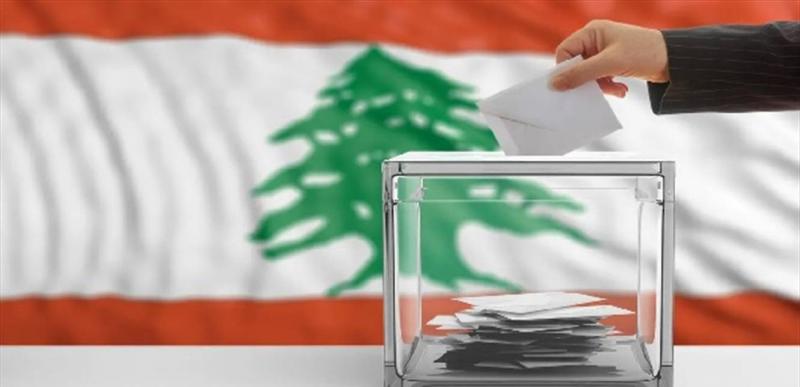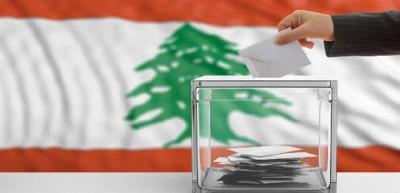The electoral atmosphere dominated the political landscape over the weekend, despite the ongoing heated discussions and the dire living conditions. This was largely due to the impending closure of the registration period for electoral lists and the approaching election date. In recent days, there has been a surge in the announcement of electoral lists amid election festivals that spread across Lebanon from the far south to the far north. Observers of the parliamentary elections told "The Republic" that although the time until this electoral event has narrowed down to just a few weeks and the electoral fervor has intensified, the first question faced by every candidate is: Will the elections take place, or will they be postponed?
While it has become difficult to cancel the elections, the conflict intensifies between a unified axis under the banner of "Hezbollah," seeking to retain the parliamentary majority, and another scattered yet united axis aiming to seize that majority. So far, there are no indications of surprises that might upend the situation, as most sentiments suggest a return to similar balances with minor differences, but with one possible exception during the elections: the silent Lebanese community may form an unexpected popular wave similar to the October 17 uprising that surprised various circles.
In this context, the results are uncertain for a fundamental reason: the elections will take place after an unprecedented collapse that has impacted the living conditions of every Lebanese citizen, following a million-strong revolution that unified the Lebanese across all arenas. This reality should not be underestimated, as statistics approach figures from a scientific viewpoint based on declared positions, but they cannot predict an electoral tsunami that could elevate representation and overturn election results entirely.
Should an unexpected popular wave emerge in the elections, given the unprecedented collapse the country has experienced, the outcome will likely favor the current majority, leading to the establishment of a new significant majority that would be hard to disrupt or paralyze. The downfall of the March 14 uprising didn't happen overnight, just as the curbing of the repercussions from the October 17 uprising did not occur through magic. While the first uprising shifted internal power balances, the second imposed its rhythm in government formation, indicating that if the elections generate a new uprising, it will impose its dynamics and rhythm.
What fuels the expectation of surprises are the considerable calls for voting from spiritual leaders, particularly those who believe that elections should be an occasion for actual change, urging people to fulfill their roles and responsibilities, and holding the ruling team accountable for the current state of the country.
As anticipation builds for the parliamentary elections, whether yielding a simple majority for one team or another, or an unexpected popular surprise, attention has begun to shift toward the phase following May 15, which marks the countdown to the presidential elections.
#### Filtration of Nominations and Electoral Lists
Just hours before the deadline for registering electoral lists for the upcoming parliamentary elections, announcements of lists and photo sessions have been quickening, leading up to the race at the parliament when ballot boxes open on May 15. By dawn tomorrow, multiple candidates will fall from the lists since they avoided getting caught in the last sieve of the withdrawal deadline on March 31, thus being omitted from the electoral lists.
#### Framework Agreement
On another front, a delegation from the International Monetary Fund (IMF) visiting Lebanon will meet today with economic bodies as part of the consultations being held with various sectors, on the sidelines of the negotiations taking place in Beirut between the Fund and official parties, seeking to reach a framework agreement before the parliamentary elections, after which the government's role will be limited to managing day-to-day operations.
Economic sources following the IMF delegation's meetings informed "The Republic" that Lebanon must achieve five vital tasks to gain the approval that would pave the way for financial aid, which are:
- Approval of the capital control law.
- Establishment of an economic recovery plan.
- Approval of the public budget project.
- Amendment of the banking secrecy law.
- Restructuring the banking sector.
The sources pointed out that financial aid from the IMF will come in several phases rather than a single lump sum, where each installment will be tied to the accomplishment of part of the agreed reforms.
#### Distribution of Losses
According to information provided to "The Republic," the delegation, which is not keen to elaborate on the points it is continuously discussing with the negotiating team and Lebanese officials, has made significant progress toward establishing the economic and financial recovery plan. However, no final agreement has been reached on the main headings, including how to distribute the losses among the four parties involved: the Lebanese state, the Central Bank of Lebanon, the banks, and the depositors, each according to their responsibilities regarding the actions and decisions that led to the current crisis.
In this context, informed sources told "The Republic" that last week's meeting with the Association of Banks in Lebanon was not final due to the conflicting views between the delegation's perspective and the banks' demands regarding the distribution of losses, particularly the request to somehow take control of the state’s properties and its institutions, which could serve as resources to compensate for financial losses through investment or allocation in multiple ways to gather resources and offset the subsequent losses of both the Central Bank and the banks along with the depositors.
#### Positions
In recent positions, Maronite Patriarch Cardinal Bechara Boutros al-Rahi stated in a sermon on Sunday from Bkerke that “our Lebanese people, as voters, need to draw on divine light to choose who is best to effect the desired change, and who is loyal to Lebanon and its people,” clarifying that “the value of elections in democratic societies lies in being an opportunity for people to change their reality for the better. To vote means to change, and to cast a ballot means to choose the best.” He emphasized that “if elections are a cornerstone of democracy, then populism should not be an election cornerstone,” stressing that “candidates should inform the Lebanese about their feasible reform projects rather than engage in unproductive accusations that we are tired of.”
He called for “the entire people to take the initiative to elect the best if they truly desire change and reform of reality, which cannot happen if citizens remain in their homes while elections are ongoing.” He pointed out that “successful parliamentary elections in both conduct and results are a guarantee of the successful election of a new president who can rise to the challenge of revitalizing Lebanon.” He stressed that “the government must expedite financial and economic reforms, as the speed of collapse far exceeds the slowness of reforms. A glaring example of the slow pace of reforms is the capital control law, which should have been enacted in 2019, yet attempts are being made to pass it now after the banks have emptied.”
Metropolitan Elijah Aoude, during his presiding over the Divine Liturgy at St. George's Cathedral, pointed out that “the people should not succumb to intimidation nor weaken due to threats or the increasing pressures of daily life, and they should not abandon their commitment to conducting the elections on time,” noting that “the power of the people lies in their free voice, if they exercise their constitutional right transparently and freely, away from bribery and subservience, focusing on the salvation of the country first.”
He emphasized that “if our people do not distance themselves from sectarian and partisan biases, our nation will not emerge from the infernal abyss, and those in power will continue to dominate the people economically, financially, culturally, and educationally. Don’t be complicit in carrying out the death sentence against this country, which was once the center of the world's attention for its social diversity, cultural advancement, exemplary medical sector, and the creativity of its sons who shone globally and were pioneers in various fields.” He urged citizens to “act according to their consciences and distance themselves from those who aim to enslave and exploit them and attempt to buy their votes. Remember your looted deposits, your destroyed homes, and your uncertain fate.”
#### Hezbollah
Furthermore, Mohammed Raad, head of the "Loyalty to the Resistance" bloc, stated during a political dialogue organized by "Hezbollah" in the southern town of Ghazieh: “We are capable, having defeated Israel when combined armies failed to do so. The weapons of the Arab regimes have rusted in warehouses and have been used internally for oppression and rather than against the enemy, to please the Americans. The Russians proposed to build a power plant without Lebanon spending a single lira, yet they impose limitations upon us due to American interests, fearing for their positions and private interests. The worst is the direct interference of the American ambassador in drafting the statement, while they talk about Hezbollah’s hegemony over the country; this is a lie. We do not dominate nor impose ourselves on anyone." He added, “We want partnership with you; no one can govern alone, even if they seem too high. The nature of Lebanon and its sectarian composition requires consensus; if we do not agree among ourselves, we will remain suffering from economic, developmental, and productive problems. We have no job opportunities because we are not producers; the authority has trained people to be lazy and rely on the rentier economy and bank interest.” He further expressed optimism despite all the problems, noting that “the reasons and solutions are known, with the first path to solution being the formation of a government with a well-thought-out program in the interest of the people and not per the conditions of this or that state. Regarding the election of the president, it is in everyone’s interest to reach an agreement on it.”
#### Ukrainian Movement
In diplomatic updates, the Ukrainian ambassador in Beirut, Ihor Ostash, will visit Foreign Minister Abdullah Bou Habib this morning in what is described as part of a diplomatic campaign by the Ukrainian government to expose atrocities committed in their country. According to “The Republic,” Ostash requested an appointment to inform Lebanon about the latest developments in the Ukrainian arena, explaining his country's position on efforts towards a ceasefire and initiatives launched to halt the Russian invasion, specifically regarding the military operation in the suburbs of Kyiv, particularly in the city of Bucha, and the massacres committed there, following accusations against the Russian army of conducting humanitarian atrocities after groups of civilian bodies were found in mass graves and it was discovered they were shot once in the head.
#### COVID-19
Regarding the COVID-19 infection count, there has been an additional decline, as the Ministry of Public Health reported in its daily update yesterday the registration of 188 new cases (188 local and zero imported), bringing the total number of cases to 1,092,995. Additionally, the report recorded three new fatalities, raising the total death toll to 10,314.




